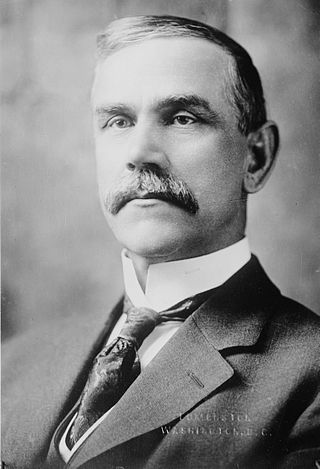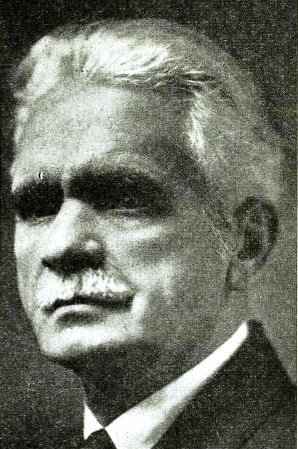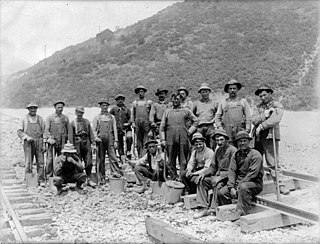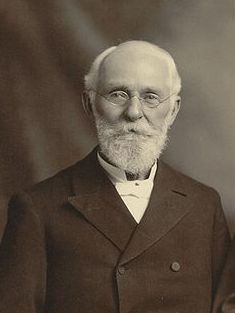Related Research Articles
The history of the Church of Jesus Christ of Latter-day Saints is typically divided into three broad time periods:
- The early history during the lifetime of Joseph Smith, which is in common with most Latter Day Saint movement churches,
- A "pioneer era" under the leadership of Brigham Young and his 19th-century successors,
- A modern era beginning around the turn of the 20th century as the practice of plural marriage was discontinued.

Polygamy was practiced by leaders of the Church of Jesus Christ of Latter-day Saints for more than half of the 19th century, and practiced publicly from 1852 to 1890 by between 20 and 30 percent of Latter-day Saint families.

Reed Smoot was an American politician, businessman, and apostle of the Church of Jesus Christ of Latter-day Saints. First elected by the Utah State Legislature to the U.S. Senate in 1902, he served as a Republican senator from 1903 to 1933. From his time in the Senate, Smoot is primarily remembered as the co-sponsor of the 1930 Smoot–Hawley Tariff Act, which increased almost 900 American import duties. Criticized at the time as having "intensified nationalism all over the world" by Thomas Lamont of J.P. Morgan & Co., Smoot–Hawley is widely regarded as one of the catalysts for the worsening Great Depression.

Mormon fundamentalism is a belief in the validity of selected fundamental aspects of Mormonism as taught and practiced in the nineteenth century, particularly during the administrations of Joseph Smith, Brigham Young, and John Taylor, the first three presidents of the Church of Jesus Christ of Latter-day Saints. Mormon fundamentalists seek to uphold tenets and practices no longer held by mainstream Mormons. The principle most often associated with Mormon fundamentalism is plural marriage, a form of polygyny first taught in the Latter Day Saint movement by the movement's founder, Smith. A second and closely associated principle is that of the United Order, a form of egalitarian communalism. Mormon fundamentalists believe that these and other principles were wrongly abandoned or changed by the LDS Church in its efforts to become reconciled with mainstream American society. Today, the LDS Church excommunicates any of its members who practice plural marriage or who otherwise closely associate themselves with Mormon fundamentalist practices.

Brigham Henry Roberts was a historian, politician, and leader in the Church of Jesus Christ of Latter-day Saints. He edited the seven-volume History of the Church of Jesus Christ of Latter-day Saints and independently wrote the six-volume Comprehensive History of the Church of Jesus Christ of Latter-day Saints. Roberts also wrote Studies of the Book of Mormon—published posthumously—which discussed the validity of the Book of Mormon as an ancient record. Roberts was denied a seat as a member of United States Congress because of his practice of polygamy.

Abraham Owen Woodruff was an American missionary who was a member of the Quorum of the Twelve Apostles of the Church of Jesus Christ of Latter-day Saints. He was also the son of LDS Church president Wilford Woodruff.

The Liberal Party was a political party established in the latter half of the 1800s in Utah Territory before the national Democrats and Republicans established themselves in Utah in the early 1890s.

The 1890 Manifesto is a statement which officially advised against any future plural marriage in the Church of Jesus Christ of Latter-day Saints. Issued by Church President Wilford Woodruff in September 1890, the Manifesto was a response to mounting anti-polygamy pressure from the United States Congress, which by 1890 had disincorporated the church, escheated its assets to the U.S. federal government, and imprisoned many prominent polygamist Mormons. Upon its issuance, the LDS Church in conference accepted Woodruff's Manifesto as "authoritative and binding."

Matthias Foss Cowley was a member of the Quorum of the Twelve Apostles of the Church of Jesus Christ of Latter-day Saints from 1897 until 1905. He resigned from the Quorum of the Twelve due to his unwillingness to support the church's abolition of plural marriage. He and John W. Taylor are the most recent apostles of the LDS Church to have resigned from their positions.

Moses Thatcher was an apostle and a member of the Quorum of the Twelve Apostles in the Church of Jesus Christ of Latter-day Saints. He was one of only a few members of the Quorum of the Twelve to be dropped from the Quorum but to remain in good standing in the church and retain the priesthood office of apostle.

The Reed Smoot hearings, also called Smoot hearings or the Smoot Case, were a series of Congressional hearings on whether the United States Senate should seat U.S. Senator Reed Smoot, who was elected by the Utah legislature in 1903. Smoot was an apostle in the Church of Jesus Christ of Latter-day Saints, one of the top 15 leaders of the church. The hearings began in 1904 and continued until 1907, when the Senate voted. The vote fell short of a two-thirds majority needed to expel a member so he retained his seat.

John Rex Winder was a leader and general authority of the Church of Jesus Christ of Latter-day Saints. He was Second Counselor in the Presiding Bishopric from 1887 to 1901, and First Counselor in the First Presidency to church president Joseph F. Smith from 1901 until his death. He was well known for his business abilities, and influenced Heber J. Grant. He was also active in politics and the militia, participating in the Utah War and the Black Hawk War (Utah). When the church came under heavy government pressure for its practice of plural marriage, Winder held the church's assets to keep them from being seized by the federal government. He was a polygamist and had four wives and 20 children.

The Mormon colonies in Mexico are settlements located near the Sierra Madre mountains in northern Mexico which were established by members of the Church of Jesus Christ of Latter-day Saints beginning in 1885. The colonists came to Mexico due to federal attempts to curb and prosecute polygamy in the United States. Plural marriage, as polygamous relationships were called by church members, was an important tenet of the church—although it was never practiced by a majority of the membership.

George Reynolds was a general authority of the Church of Jesus Christ of Latter-day Saints, a longtime secretary to the church's First Presidency, and a party to the 1878 United States Supreme Court case Reynolds v. United States, the first freedom of religion case to issue from that court.
The General Handbook: Serving in The Church of Jesus Christ of Latter-day Saints is an on-line book of instructions and policies for leaders and members of the Church of Jesus Christ of Latter-day Saints. The contents are prepared by the church's First Presidency and Quorum of the Twelve Apostles. Along with the church's standard works, the General Handbook stands as the preeminent policy and practice guide for the leaders of the LDS Church.

The "Second Manifesto" was a 1904 declaration made by Joseph F. Smith, the president of the Church of Jesus Christ of Latter-day Saints, in which Smith stated the church was no longer sanctioning marriages that violated the laws of the land and set down the principle that those entering into or solemnizing polygamous marriages would be excommunicated from the church.
The 1978 Revelation on Priesthood was an announcement by leaders of the Church of Jesus Christ of Latter-day Saints that reversed a long-standing policy excluding men of Black African descent from the priesthood and both Black men and women from priesthood ordinances in the temple. Leaders stated it was a revelation from God.

Possibly as early as the 1830s, followers of the Latter Day Saint movement, were practicing the doctrine of polygamy or "plural marriage". After the death of church founder Joseph Smith, the doctrine was officially announced in Utah Territory in 1852 by Mormon leader Brigham Young. The practice was attributed posthumously to Smith and it began among Mormons at large, principally in Utah where the Church of Jesus Christ of Latter-day Saints had relocated after the Illinois Mormon War.
Mark Paredes is the former author of the "Jews and Mormons" blog for The Jewish Journal of Greater Los Angeles and served as a bishop in the Church of Jesus Christ of Latter-day Saints in Los Angeles. He served as a U.S. diplomat at the United States Embassy in Tel Aviv from 1994 to 1996 and the U.S. Consulate General in Guadalajara, Mexico from 1991 to 1993. He also worked as the press attaché for the Consulate General of Israel in Los Angeles, the National Director of Hispanic Outreach for the American Jewish Congress, and the Executive Director of the Western Region of the Zionist Organization of America.

Early in its history, the Church of Jesus Christ of Latter-day Saints had a series of negative encounters with the federal government of the United States. This led to decades of mistrust, armed conflict, and the eventual disincorporation of the church by an act of the United States Congress. The relationship between the church and the government eventually improved, and in recent times LDS Church members have served in leadership positions in Congress and held other important political offices. The LDS Church becomes involved in political matters if it perceives that there is a moral issue at stake and wields considerable influence on a national level with over a dozen members of Congress having membership in the church in the early 2000s, and about 80% of Utah state lawmakers identifying as LDS.
References
- Thomas G. Alexander, "Political Manifesto", in Arnold K. Garr, et al., The Encyclopedia of Latter-day Saint History (Salt Lake City, Utah: Deseret Book, 2000), p. 701.